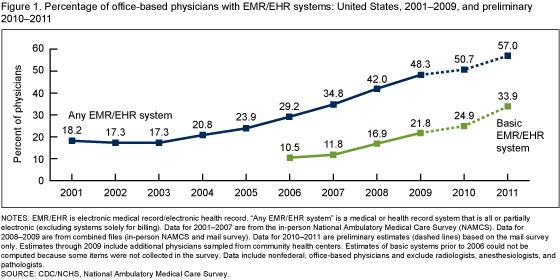¿Ha notado una reducción en la cantidad de papel utilizado en el consultorio de su médico de cabecera? De acuerdo con CDC, el 57 por ciento de los médicos que trabajan en oficinas han comenzado a usar registros médicos/historiales de salud electrónicos (EMR / EHR) como sistemas del 2011, frente a solo el 18 por ciento en 2001. Según esta tendencia, la empresa de investigación, MarketsandMarkets estima que las industrias de registros médicos electrónicos y de historiales médicos electrónicos llegarán a los $6 mil millones para el 2012 solo en los EE. UU.
There is no denying that digitizing medical records has the potential to keep patient documents safer and improve overall quality of patient coordination and care. However, this is only true if healthcare professionals have the right tools to help them effectively access these records. For the health industry, the implementation of tablet devices can offer the benefit of true mobility when it comes to showing patient information and making changes in real-time, while cutting costs for paper and the associated hassles of hard-copy records.
When determining the right tablet solution for medical industry professionals, it is crucial that resellers consider the following points:
Security: Clearly, security is a huge concern for professionals and patients alike. Windows-based tablets are an answer, as they include features such as built-in firewalls and data recovery settings. Third-party software and services can also further enhance device security and it is important to note that the Windows platform supports more of these features than the typical mobile operating system.
Image quality: Ultrasound imaging solutions manufacturer Interson Corporation is using our ViewPad 10 as part of its latest ultrasound solution to display images and data from its propriety ultrasound probe. As your customer will also likely be using the tablet for the review of critical client X-rays and other medical scans, excellent display quality is critical for an accurate diagnosis.
Processing power: For medical imaging needs, a higher quality processor may be required to handle a hospital's various software programs. Also consider that since FDA approval of the first mobile medical app in 2009, the use of medical apps will continue to grow and become more widely accepted, meaning tablets will need not only a great processor but also extensive storage options to support these applications.
What trends are you seeing in the medical field when it comes to the digitalization of client records? How do you feel the introduction of tablets into the medical profession will change the way patients receive treatments? Share your thoughts with us here on the blog.
Adoption of EMR/EHR systems by office-based physicians has increased.






Formulario de inicio de sesión y registro